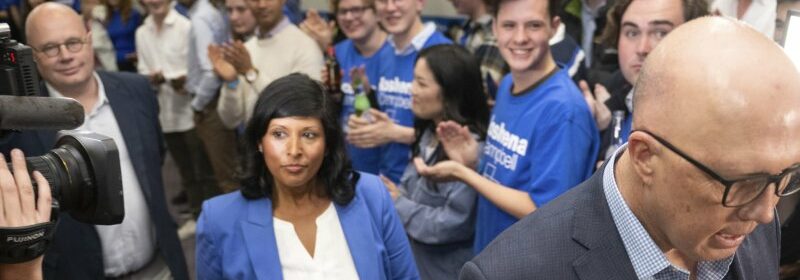Senior Liberal blames Scott Morrison’s unpopularity for historic Aston loss

Save articles for later
Add articles to your saved list and come back to them any time.
The Victorian Liberal Party lost the seat of Aston in this month’s byelection because it is still reeling from the disasters of the Morrison government almost a year after the Coalition was defeated, according to a senior member of the party’s governing body.
Vice-president Ian Quick posted the candid missive on his private Facebook page last week after party president Greg Mirabella told Liberal members the Victorian division was unelectable and have no one to blame but themselves for voters abandoning them in the country’s second-largest state.
Quick identified three major reasons the party lost the seat of Aston: parachuting in the candidate Roshena Campbell, running a poor local campaign, and voters’ negative perceptions of former prime minister Scott Morrison that were exacerbated by revelations he held secret ministerial portfolios.
“The Aston result, in my view, was caused by three major things,” Quick said.
“1) An admin preselection (I voted against it) that parachuted in a candidate who was good, but had too much of a handicap from the start. 2) The campaign, while very busy, was strategically mishandled. It was sort of run like the last Kooyong one, with a similar result.
“3) The negative view of the Morrison government (shared by quite a few Liberals, even worse now due to the secret roles of the then-PM) and the view that nothing has changed since.”
In November, Morrison was censured in federal parliament for eroding public trust in democracy after it was revealed he was secretly sworn in to administer the departments of treasury, home affairs, health, finance, and industry, science, energy and resources during his last term in government.
As an addendum to his April 4 post, Quick acknowledged even if the local campaign was as good as he would have wanted, he did not believe the Liberals would have won Aston.
The Liberal Party is reeling after it lost one of its heartland seats following the retirement from politics of controversial former cabinet minister Alan Tudge, becoming the first opposition in a century to lose a seat to a federal government in a byelection.
Labor’s Mary Doyle, who shaved 8 per cent from Tudge’s margin at the 2022 election, secured a further 6 per cent two-party preferred swing against Campbell.
Federal Opposition Leader Peter Dutton and Roshena Campbell arrive to give the concession speech after losing the Aston byelection to Labor’s Mary Doyle.Credit: Penny Stephens
Mirabella last week revealed he had commissioned “detailed research” to better understand why the party was performing so poorly in Victoria. The report will not be made public, but is soon expected to be handed to members of the powerful administrative committee.
The Liberals ditched a rank-and-file vote to elect Tudge’s replacement to expedite the process and give the candidate time to campaign in the seat. Campbell won a secret ballot of the administrative committee meeting, beating Cathrine Burnett-Wake and Ranjana Srivastava.
Labor portrayed Campbell, who was widely regarded within the Liberals as a standout candidate, with being parachuted into the outer eastern suburban seat where she has no ties because she lives in Brunswick in Melbourne’s inner-north.
Kos Samaras, director at the non-partisan RedBridge Group and former assistant secretary of the Victorian Labor Party, said the Liberal Party was struggling with the increasing number of voters from culturally diverse communities, voters under the age of 40, and those with tertiary qualifications.
He said the Liberal Party had been unable to match the effectiveness of Labor’s campaign machine.
“If you come up in the ranks of Labor, which is a vicious bear pit at the best of times, you still have to perform. Nepotism isn’t as rife as it is in the Liberal Party,” Samaras said. “A lot of the operatives always presume they’re going to lose, so their political survival skills are more finely tuned.”
Samaras pointed to the low voter turnout in the Aston byelection and Labor’s ruthless targeting of Labor voters reminding them to turn out on April 1.
He said political operatives assumed it would be Labor voters unaware of the looming byelection, prompting the Labor Party to focus heavily on those who were likely to vote for them via text messages, emails and other forms of advertising to remind them to turn out.
“Because the Libs assumed [the low turnout] was going to hurt Labor, they didn’t do anything,” Samaras said. “That may have cost them a percentage – but it’s all those factors rolled into one big pot [that caused the loss].”
Quick could not be contacted for comment.
Cut through the noise of federal politics with news, views and expert analysis from Jacqueline Maley. Subscribers can sign up to our weekly Inside Politics newsletter here.
Most Viewed in Politics
From our partners
Source: Read Full Article
